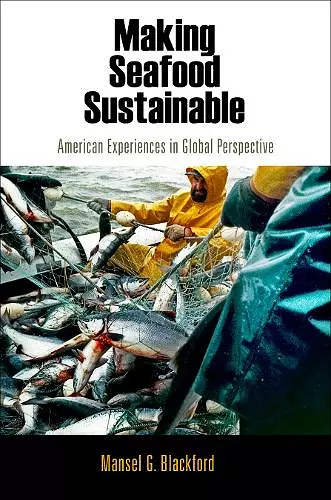Making Seafood Sustainable
American Experiences in Global Perspective
Format:Hardback
Publisher:University of Pennsylvania Press
Published:27th Feb '12
Currently unavailable, and unfortunately no date known when it will be back

Making Seafood Sustainable shows how and why sustainable fishing and seafood management can work by looking at past success stories in dealing with the global overfishing crisis, especially in American waters.
In the spring of 2007, National Geographic warned, "The oceans are in deep blue trouble. From the northernmost reaches of the Greenland Sea to the swirl of the Antarctic Circle, we are gutting our seas of fish." There were legitimate grounds for concern. After increasing more than fourfold between 1950 and 1994, the global wild fish catch reached a plateau and stagnated despite exponential growth in the fishing industry. As numerous scientific reports showed, many fish stocks around the world collapsed, creating a genuine global overfishing crisis.
Making Seafood Sustainable analyzes the ramifications of overfishing for the United States by investigating how fishers, seafood processors, retailers, government officials, and others have worked together to respond to the crisis. Historian Mansel G. Blackford examines how these players took steps to make fishing in some American waters, especially in Alaskan waters, sustainable. Critical to these efforts, Blackford argues, has been government and industry collaboration in formulating and enforcing regulations. What can be learned from these successful experiences? Are they applicable elsewhere? What are the drawbacks? Making Seafood Sustainable addresses these questions and suggests that sustainable seafood management can be made to work. The economic and social costs incurred in achieving sustainable resource usage are significant, but there are ways to mitigate them. More broadly, this study illustrates ways to manage commonly held natural resources around the world—land, water, oil, and so on—in sustainable ways.
"Intelligent, provocative, and well researched, with delightful writing throughout. Blackford has a grasp on the ways in which global developments manifest themselves in American fisheries on a number of different levels: economic, environmental, cultural, and political. Indeed, Blackford demonstrates that all of these local manifestations of globalization are connected to each other." * Arthur F. McEvoy, Southwestern Law School *
ISBN: 9780812243932
Dimensions: unknown
Weight: unknown
288 pages